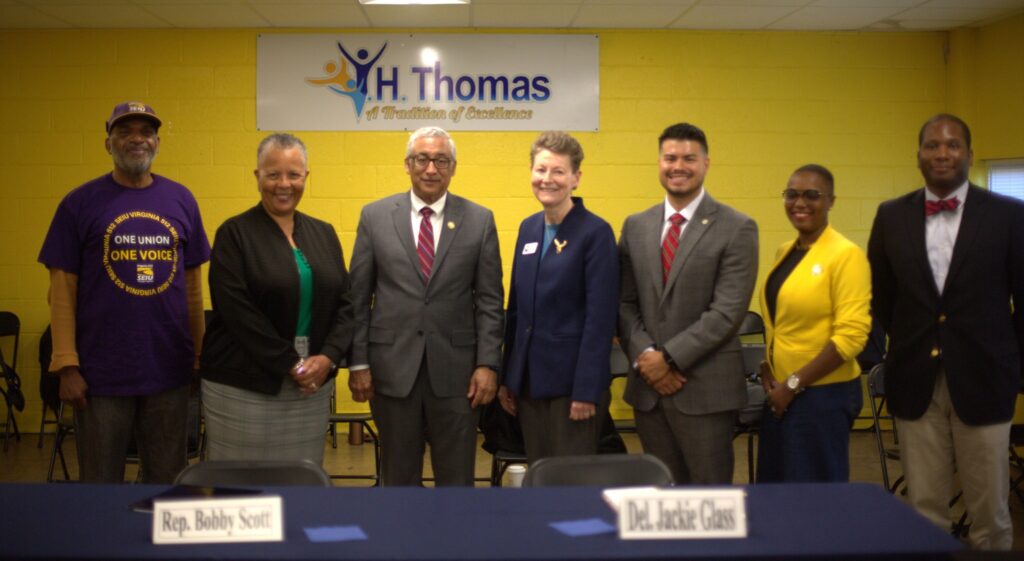April 18, 2025
Community Leaders Join Congressman Bobby Scott’s Roundtable, Discuss TCI Report on How Proposed Medicaid Cuts Would Hurt Veterans and Military Families
U.S. House budget framework cannot be accomplished without making major cuts to Medicaid, threatening the health care of nearly 2 million people in Virginia overall

On Thursday, The Commonwealth Institute (TCI) participated in a roundtable discussion with Congressman Bobby Scott (VA-03), elected leaders, experts, and community members to address proposed Medicaid cuts and the challenges they would pose to Virginia’s veterans.
Experts on the roundtable included Delegate Jackie Glass (HD-89); Dr. Joan Lingen, Chief Medical Officer, Eastern Shore Rural Health System; Bryant Thomas, Vice President of Advancement, Children’s Hospital of the King’s Daughters; Freddy Mejia, Policy Director, The Commonwealth Institute; Angela Futrell, Chief Executive Officer, Southeastern Virginia Health System; and SEIU Virginia 512 member Tony Hedgepeth, a veteran and Medicaid-funded home care provider to veterans.
“So we’ve heard some word games being played that some are now saying they will not cut Medicaid,” said Congressman Scott. “But let’s be clear, their ultimate goal is to cut Medicaid in order to fund massive tax cuts for the wealthy. We know that would have a devastating impact on millions of people who would lose their health care coverage. Hospitals and nursing homes across the country could be forced to close. These cuts could hurt children, families, pregnant women, our seniors, people with disabilities, all of whom rely on Medicaid. And as we highlighted today, veterans and military families here in Hampton Roads would also be at risk of losing their health care.”
“I feel like my heart breaks because the number of veterans that have said to me that ‘I don’t know what I’m going to do’, the number of caretakers that have said ‘I don’t know how we’re going to make it through this,’ that too, has a dire effect on … mental health, physical health,” said Delegate Glass, who is a veteran. “So just the fact that we’re in this conversation with [veterans] …to put them into this sort of turmoil, it feels very violent and traumatic … It is a fight. It is an all-out fight. And as a veteran, I’ll say, ‘not on my watch.’”
Over 1 in 5 people in Virginia (nearly 2 million residents) access health care through Medicaid/CHIP. Nearly 630,000 adults currently have health coverage due to Virginia lawmakers’ decision to expand Medicaid in 2018 — progress that is now being threatened by discussions to cut federal funding for expansion. Community leaders are concerned about the impact this would have on their organizations and communities.
“Before Medicaid expansion, the dollars that we got from the federal government, you stretched those dollars to try to meet the needs of everybody … But with Medicaid expansion, the lightbulbs came on. We could get medications, [people] could go into rehab for PT and OT. The world just changed, ” said Angela Futrell, Chief Executive Officer, Southeastern Virginia Health System.
Congress is also considering a proposal to impose work reporting requirements. Nationally, 92% of adults under 65 and enrolled in Medicaid work for pay or would likely qualify for an exemption due to a disability, caring for family members, or attending school. Advocates expressed concerns that additional administrative red tape could hinder their care.
“Work reporting requirements are just another hoop to jump through to access care. Instead, these requirements kick people off of coverage, often people who are working, who are caring for a loved one, who thought that they submitted what they needed to submit one time and then found out that they had to do it two or three more times,” said Freddy Mejia, Policy Director, The Commonwealth Institute. “When people lose coverage and lose access to early intervention, emergency rooms cover the cost, which ultimately gets passed on to the state and is costly for everyone.”
“We will be sending our outreach teams to help facilitate that paperwork requirements, which will then require that we remove them from doing other community functions, supporting the health and wellness of our communities, because they’re going to be busy trying to get paperwork done,” said Dr. Joan Lingen, a veteran and Chief Medical Officer of Eastern Shore Rural Health System.
Congressman Scott highlighted a new TCI report detailing potential harm to veterans and military families in Virginia. TCI’s analysis shows over 47,000 Virginia veterans access some level of health coverage through Medicaid and risk losing it if cuts occur.
“Don’t take away our Medicaid, don’t take away our system that we depend on. Most veterans live paycheck to paycheck … when we talk about taking away their survival system, their mental health is going to be affected. So we need to do everything we can to stop this steal, to stop giving away our money to the wealthiest and give it to the ones that served their country,” said SEIU Virginia 512 member Tony Hedgepeth, a veteran and Medicaid-funded home care provider to veterans.
Congress returns from recess at the end of the month to work out the details of a framework that calls for the House Energy and Commerce Committee to cut up to $880 billion in spending. The Congressional Budget Office noted that cutting $880 billion from the committee’s programs would require significant cuts to Medicaid.
Find TCI’s latest report, “Federal Medicaid Cuts Would Especially Harm Virginia Military Members, Veterans, New Parents, and People in Rural Areas,” here.
